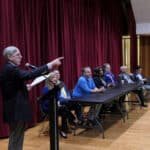All…here is Saline County Judge Jeff Arey’s April 17 Update. Confirmed Cases up slightly. Judge Arey also highlighted the State Legislature’s Approval of County Meetings via electronic means.
Justice of the Peace
Saline County Quorum Court
Email from Judge Jeff Arey
To All Saline County Residents,
Attached are the numbers for Saline County as of last night. Confirmed Cases moved up 2 to a total of 36. Recoveries also grew by 2.
The 92 General Assembly passed HB1082 and was signed by the Governor yesterday. Section 42 of the Act states if the Governor declares a disaster emergency pursuant to the Arkansas Emergency Services Act of 1973, then “a public entity may assemble, gather, meet, and conduct an open meeting through electronic means, including without limitation by: Telephone, Video Conference, or Video Broadcast.”
The Act goes on to state that the public may attend the open meeting using electronic means, and that in the regular notice to the public of the date and time of the meeting, notice should also be provided to the public on how to attend the meeting electronically. Any usual requirement for physical attendance is waived.
The meeting shall be recorded, either by an audio, video with audio, or digital or analog broadcast capable of being recorded, and that recording shall be kept for one year.
I appreciate our Saline County Legislative representatives working hard on this. Saline County will be utilizing this law in some form with our meetings.
Stay Safe, and remember no more than 10, stay 6 feet apart, wear a mask and wash your hands!
Jeff Arey

Saline County Judge
200 North Main Street,
Suite 117
Benton, Arkansas 72015
501-303-5640
***
The Following Message was sent by Chris Villines – Executive Director from AA
HB1082, was passed by the 92nd General Assembly and signed by the Governor on April 16, 2020. We are awaiting the specific Act number but this has been filed with the Secretary of State’s office and is now law. Section 42 of the Act states if the Governor declares a disaster emergency pursuant to the Arkansas Emergency Services Act of 1973, then “a public entity may assemble, gather, meet, and conduct an open meeting through electronic means, including without limitation by: Telephone, Video Conference, or Video Broadcast.” The Act goes on to state that the public may attend the open meeting using electronic means, and that in the regular notice to the public of the date and time of the meeting, notice should also be provided to the public on how to attend the meeting electronically. Any usual requirement for physical attendance is waived. The meeting shall be recorded, either by audio, video with audio, or digital or analog broadcast capable of being recorded, and that recording shall be kept for one year.
The Act goes on in Section 43 to state that Section 42 is “cumulative of existing laws and suspends, but does not repeal, any law in conflict with Section 74 [engrossing error – should be 42] of this act.” It states that Section 42 is temporary and expires on the earlier of: the date the Governor’s disaster emergency declaration ends, or on December 31, 2020. Upon its expiration, all provisions of law suspended by Section 74 [engrossing error – should be 42] will again be in full force and effect, and teleconference meetings will no longer be permitted where otherwise not allowed by law. The Emergency Clause sets the effective date for Sections 42 and 43 as the day of the Act’s approval by the Governor.
Below please find two pieces of guidance relating to the temporary relaxation of the laws regarding our public meetings by allowing them to be conducted via electronic means. First, you will find some details on what the new law allows as well as direction on its applicability to your meetings. The second piece of guidance is a practical recommendation on how to handle a teleconference call should this be the method you choose:
Guidance Part I:
- Applicability
Section 42 amends the public meetings requirement of the Freedom of Information Act. Therefore, this temporary allowance of meetings by teleconference, video conference, or video broadcast would apply to all “public meetings” of a governmental body subject to the Freedom of Information Act. For county purposes, this includes, but is not limited to: regular or special quorum court meetings, quorum court committee meetings, county administrative or advisory board meetings, county fair board meetings, county hospital board meetings, county public facilities board meetings, employee grievance hearings, etc. Section 43 suspends certain laws that normally require physical presence of the body, including 14-14-904(a) specifically requires that the quorum court meet and “assemble” at a regular date, time, and place, which is set by the county procedural ordinance.
- Logistics of the Public Meeting
Section 42 permits public meeting by “Telephone, Video conference, or Video broadcast.” This could be by the members of the body participating by traditional telephone conference call; video and audio conferencing service such as Zoom, Skype, FaceTime, or other similar medium; by meeting in-person following state social distancing guidance or directives and broadcasting the meeting on television or online, via YouTube, Facebook, so other similar medium. It may be desirable to still have the county judge, secretary, and one or two low-risk quorum court members to still meet in-person practicing social distancing, at least for the first meeting, and have the rest of the court join remotely.
- Public Attendance and Public Comment
You may not want to give your conference call information, Zoom meeting ID, or other to fully access to the electronic meeting to the public. Your meeting could get away from you quickly if you are not familiar with how to conduct these meetings in an orderly manner. Under this Act, the public’s right to attend would be fulfilled by allowing them to watch the meeting via video streaming on YouTube, or broadcast on your local TV or radio. If you do a telephone conference call and give the public access to the call-in information, I highly recommend keeping everyone but the members of the court, county judge, and secretary muted. The public’s right to comment could be accommodated in a number of ways. In your notice of the meeting, you could give an e-mail address for them to e-mail their comments ahead of time, to be read by the secretary over the call. You could have the public send you their phone numbers ahead of time, so that you could call them during the meeting and let them give their comment in real-time during the meeting. Or, if on a telephone conference call, you could unmute the lines at the end of the meeting and attempt to let the public comment that way. Just beware, this could get disorderly quickly.
- Grievance Hearings/Executive Sessions
Teleconference or remote video meetings could get tricky if you must go into executive session for a grievance hearing or other lawful reason. We hope that there will no need for executive session during this emergency disaster declaration, but we want you to be cognizant of the laws in case you do. Pursuant to Ark. Code Ann. §25-19-106(c) quorum courts can only go into executive session “for the purpose of considering employment, appointment, promotion, demotion, disciplining, or resignation of any public officer or employee.” Only the quorum court and the county judge have access to the executive session portion of a meeting, as well as the employee involved and the employee’s immediate supervisor, when requested by the governing body. The county attorney is not permitted to attend the executive session. Executive session should be preceded by a public meeting stating the reason for going into executive session, and then followed up by a public meeting if any vote is to be taken. Votes cannot take place in executive session. In the instance of a grievance hearing, the petitioner is not required to appear in person. However, you may want to have the petitioner say on the record that they are waiving their right to appear in person and are willing to hold the hearing electronically.
Guidance Part II:
Having utilized several electronic meeting platforms in recent days, we have all discovered many different and effective ways to meet. One of the most easily controlled platforms is the simple teleconference, and we have some recommendations should this be the mode you use.
First of all, if you have never set up a teleconference line, we are happy to recommend our provider – Shane Hall, President of Cloud CCI here in Arkansas. He can be reached at 501-218-8956 or by email at shall@cloudcci.com. Prices are affordable and we can help walk you through how to facilitate teleconferences from our experiences.
Our guidance is pretty simple – you need to mute all callers at the beginning of the call, ours automatically does this. Give written guidance to the Quorum Court members on how they can press the right key to go off mute (*1 for our system). Only tell the general public how to unmute their phones when (and if) you are giving them time to talk. Long and sometimes awkward pauses are necessary to give people time to unmute their phones.
There is also a code in our system that can automatically re-mute everyone on the call – this is called lecture mode. Should you have someone inadvertently (or purposefully) go off mute, you can re-mute everyone with this *3 code and then have your quorum court members aware that they have to press *1 to go off of mute again.
And with any electronic system, please make sure you have a practice run or two with whoever is operating the call so they can get used to it. As is always the case, please contact us if you need any help – and remember the codes above may be different with different teleconference services.
HB1082 can be found here.
4.17.20 Saline Co. COVID-19 Spreadsheet Data
[embeddoc url=”https://hotspringsvillagepeople.com/wp-content/uploads/2020/04/OEM-COVID-Spreadsheet-4-16-20.xlsx” download=”all” viewer=”google”]***
Thank you for reading. Be sure to bookmark this site so you don’t miss any updates.
Click here to visit our Private Facebook Group.










